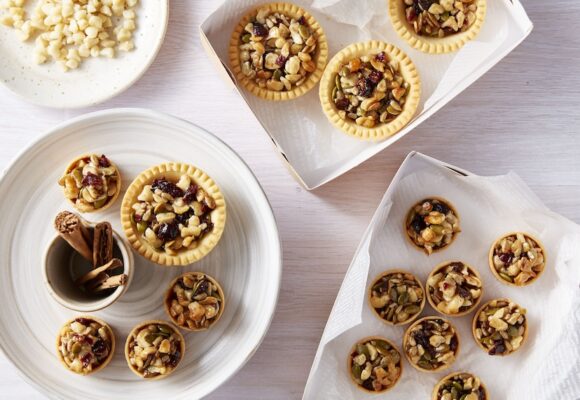Preliminary research suggests nuts could be good for gut health, which adds to the large body of evidence on how nuts improve health and wellbeing.
The gut microbiome (the community of different bacteria in the intestine) is an increasingly popular area of study among researchers and is now believed to impact on the development of chronic diseases. Preliminary research suggests nuts and especially nut skins could benefit your gut health thanks to their high fibre levels and antioxidant and anti-inflammatory properties. All nuts, including macadamias, contain fibre.
Nuts For Life Dietitian Lisa Yates APD explains how:
“We’ve assumed the trillions of gut bacteria living in our large intestine are only there to help keep the colon healthy but this exciting new area of study is uncovering how gut bacteria impacts metabolism, inflammation and chronic disease such as obesity,” said Lisa Yates.
While the jigsaw is not complete and pieces of the puzzle are missing, there are many possible mechanisms:
- Nuts feed the gut bacteria – Nuts and nut skins are rich in fibre – a prebiotic 1-3, which feeds the probiotic bacteria that live in the gut. A study found that around two handfuls (56g) of almonds or 10g of almond skins a day for six weeks significantly increased growth of beneficial strains of gut bacteria 4. Similar results have been found for pistachios 5.
- Probiotic protectors – Nuts may offer protection to probiotic bacteria. A study published in Food Microbiology found chestnut extract and chestnut flour help different strains of lactobacilli bacteria to survive stomach acids and bile 6. This means they are more likely to make it to the large intestine intact where they do their good work.
- Maintain a healthy weight – It is early days yet but the impact that nuts have on protecting and / or promoting healthy bacteria in the gut may be yet another way nuts help control body weight. It’s all to do with healthy bacteria and the compounds they generate and the function these compounds have on weight control mechanism.
- Healthy bacteria feed on fibre, fermenting it to product short-chain fatty acids (SCFAs). These compounds may play a role in weight management by influencing hormones in the gut that make us feel full and making the body more sensitive to insulin 7-9. High insulin levels can cause weight gain 9. Some bacterial strains are also able to harvest more energy from fibre, which may lead to weight gain 9.
- Research also shows that people with greater diversity of intestinal bacteria and higher levels of specific bacterial strains are less likely to be overweight, have less insulin resistance, and lower blood cholesterol and inflammation 10,11.
“So many foods impact on the amount and diversity of bacteria and nuts are one of those foods. Nuts’ combination of prebiotic fibre and phytochemicals with antioxidant and anti-inflammatory effects may explain why.
“This new area of study offers promising results. While there are more questions to be answered to find those missing jigsaw pieces, it is important that healthy diets are high in fibre to influence the type of bacteria in the intestine. This means eating more fruits, vegetables, legumes, wholegrains, fermented dairy and other fermented products, and of course a handful (30g) of nuts a day – all to provide sources of pre- and probiotics in the diet.”
Issued by Nuts For Life, Australia’s leading nutrition authority on tree nuts.
For more information visit www.nutsforlife.com.au or email admin@nutsforlife.com.au
References
- Mandalari G, et al. In vitro evaluation of the prebiotic properties of almonds skins (Amygdalus communis L.). FEMS Microbiol Lett. 2010 Mar;304(2):116-22
- Liu Z et al In vitro and in vivo evaluation of the prebiotic effect of raw and roasted almonds (Prunus amygdalus). J Sci Food Agric. 2016 Mar;96(5):1836-43
- Mandalari G et al. Potential prebiotic properties of almond (Amygdalus communis L.) seeds. Appl Environ Microbiol. 2008 Jul;74(14):4264-70.
- Liu Z, et al. Prebiotic effects of almonds and almond skins on intestinal microbiota in healthy adult humans. Anaerobe. 2014 Apr;26:1-6
- Ukhanova M, et al. Effects of almond and pistachio consumption on gut microbiota composition in a randomised cross-over human feeding study. Br J Nutr. 2014 Jun 28;111(12)2146-52.
- Blaiotta G, et al. Effect of chestnut extract and chestnut fiber on viability of potential probiotic Lactobacillus strains under gastrointestinal tract conditions. Food Microbiol. 2013 Dec;36(2):161-9.
- Kootte, R.S et al. The therapeutic potential of manipulating gut microbiota in obesity and type2 diabetes mellitus. DiabetesObes.Metab. 2012;14:112-120
- Chakraborti CK et al. New-found link between microbiota and obesity. World J Gastrointest Pathophysiol. 2015 Nov 15;6(4):110-9.
- Caricilli AM, Saad MJA. The Role of Gut Microbiota on Insulin Resistance. Nutrients. 2013;5(3):829-851.
- Ley, R.E et al. Microbial ecology: human gut microbes associated with obesity. Nature 2006; 444,1022-1023.
- Le Chatelier, E et al. Richness of human gut microbiome correlates with metabolic markets. Nature 2013;500:541-546.


